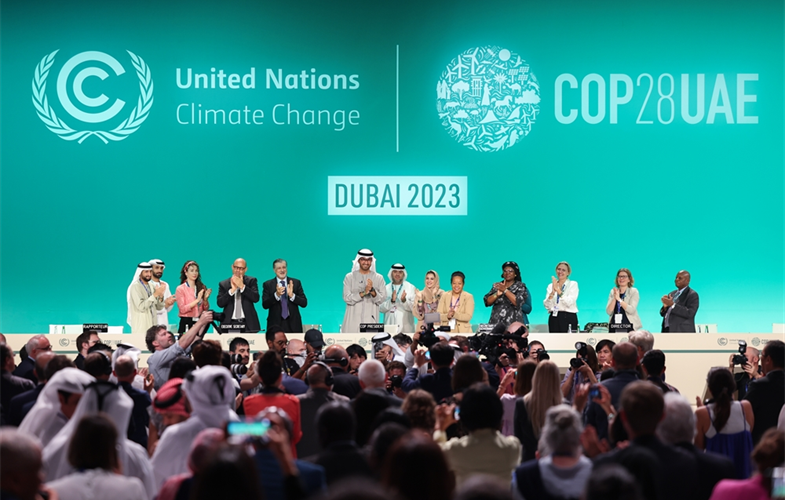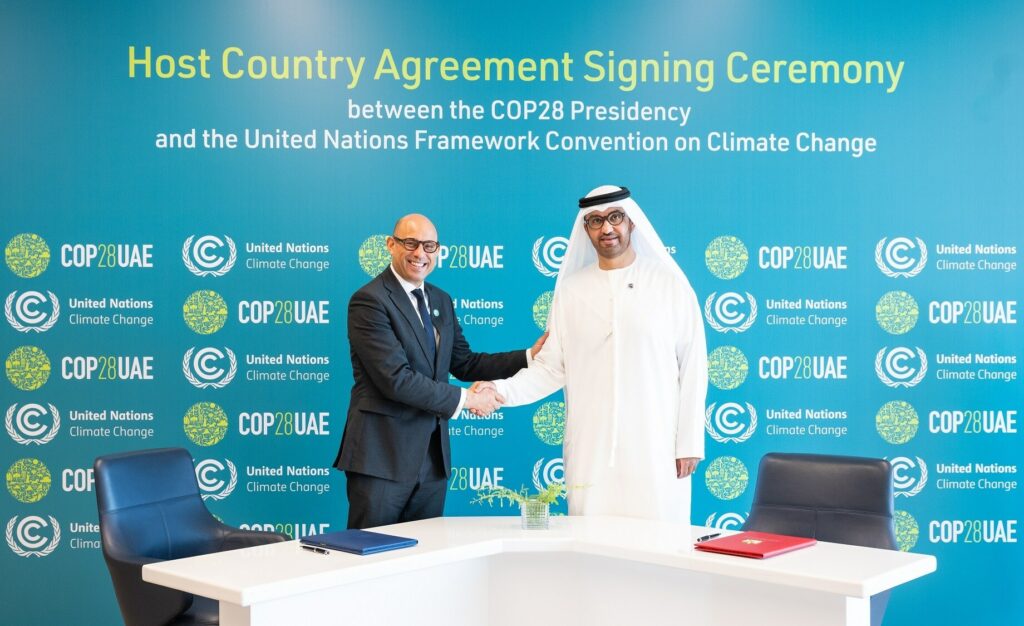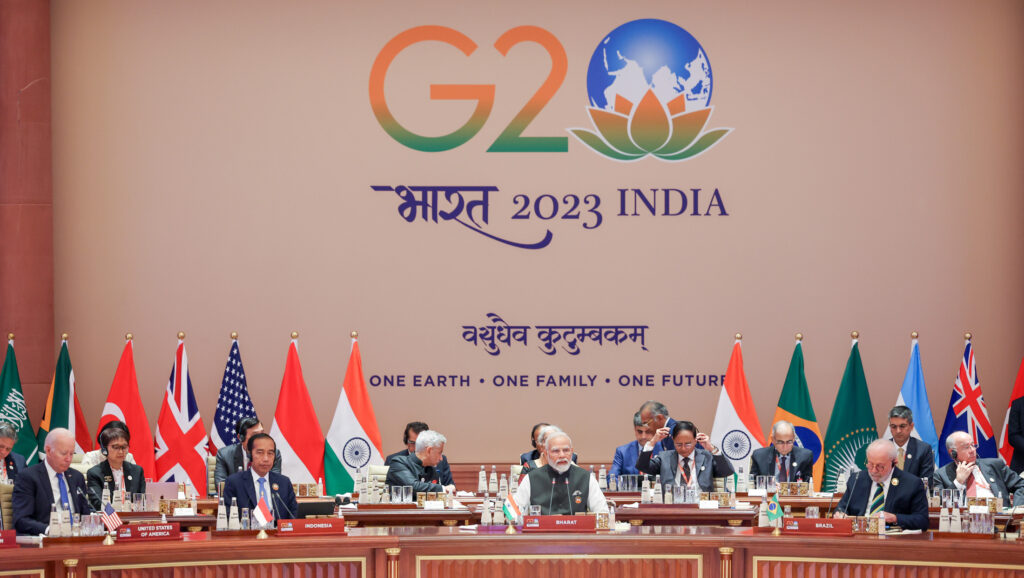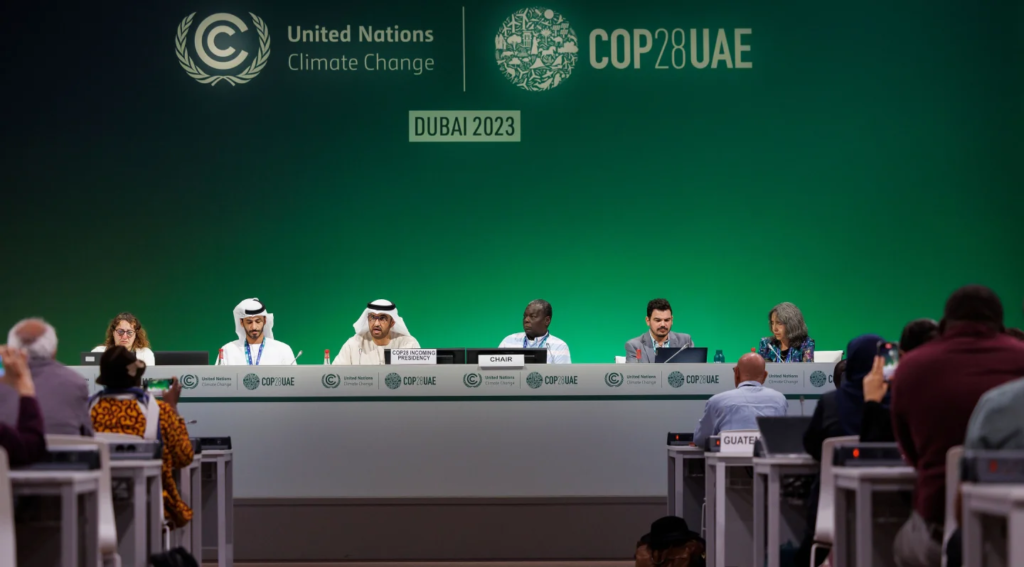COP28 moves climate debate from ‘just words’ to just transition

Global Greenhouse Gas emission-levels in 2030 are now projected to be only 5.3 pc lower than in 2019
Oil from the United Arab Emirates is shipped to the outside world starting from narrow Strait of Hormuz and then wider Gulf of Oman and then into vast Ocean to reach various part of the world. Under Presidency of the UAE, the recently concluded climate change negotiations, COP28 went through a similar pathway. It started with narrow but significant win by operationalising loss and damage fund, on the very first day.
Then the journey went through the wider but more troubled waters. As the negotiations drew closer to the deadline of December 12, UAE’s Presidency was severely criticised for not including the words of ‘phase out of fossil fuel’ in the final draft of the agreement.
And finally it embraced the much-acclaimed oceanic success in getting, what is now known as ‘UAE Consensus’ that included for the first time in history of COPs included the phrase of ‘transition away from fossil fuel’!
However, for me, the seminal success was in yet another phrase included in final decision. Let me explain.

COP28 President-Designate Dr. Sultan Al Jaber and United Nations Framework Convention on Climate Change (UNFCCC) Executive Secretary, Simon Stiell (PRNewsfoto/COP28)
The year 2023 started with nomination of Sultan Ahmed Al Jaber as President of COP28. He is a senior Minister in UAE government and Managing Director and Group CEO of the Abu Dhabi National Oil Company (ADNOC). The influential Western media questioned the choice of the President who is drenched in fossil fuels. But they conveniently forgot that UAE was only the seventh largest oil-producing country in the world, where as fourth largest oil-producing country Canada and other top ranking fossil fuel-gas and coal-producing countries including Germany, Poland, India, South Africa have hosted COPs. Some of Presidents of COPs in those countries were intensely engaged in promoting the energy from fossil fuels for the benefit of their own countries.
Moving to mid-2023, the communique of G7 Summit held in Hiroshima in Japan in May 2023 clearly stated the commitment to accelerate the ‘phase-out of unabated fossil fuels so as to achieve net zero in energy systems by 2050 at the latest in line with the trajectories required to limit global average temperatures to 1.5°C above preindustrial levels and call on others to join us in taking the same action’. It did admit that the goal of annual mobilisation of USD 100 billion for developing countries’ mitigation action has not been achieved but it included commitment to meet that goal.
At the same time, as India, that held the Presidency of G20 in 2023, invited the UAE to take part in the G20 deliberations as an observer. As G20 is collectively responsible for about 80 pc of global emissions, the issue was discussed in detail and under Indian Presidency, the G20 Summit made several key decisions and statements.
The G20 Declaration urged all countries that have not yet aligned their Nationally Determined Contributions (NDCs) with the temperature goal of the Paris Agreement, to revisit and strengthen the 2030 targets in their NDCs, as necessary, by the end of 2023, taking into account different national circumstances. It also set a target to triple renewable energy capacity globally by 2030, even as G20 members reiterated their commitment to achieve global net zero GHG emissions and carbon neutrality by or around mid-century.
But most significantly, the declaration also called on the developed nations to keep their commitment of mobilising USD 100 billion a year by 2020 for climate finance to help developing countries in transition, mitigation and adaptation.
Recognising the need for increased global investments to meet climate goals of the Paris Agreement, and to rapidly and substantially scale up investment and climate finance from billions to trillions of dollars globally from all sources, the G20 noted the need of USD 5.8-5.9 trillion in the pre-2030 period required for developing countries, in particular for their needs to implement their NDCs, as well as the need of USD 4 trillion per year for clean energy technologies by 2030 to reach net zero emissions by 2050.
In his speech at COP28, Indian Prime Minister Narendra Modi evoked the G20 Declaration and also highlighted the minimal role of global south in root cause of climate crisis, while bearing a disproportionate amount of adverse impacts of climate change. Few rich countries in the world, he said, have destroyed the planet’s nature in indiscriminate manner and today poor countries have to face its consequences in the form of climate change, among others. Citing the example of India, he said that while India’s population was 17 pc of global population, but its carbon-emission was less than 4 pc of global emissions.
The complex web of the agenda of COP28, revolved for 12 days around three main pillars, namely Climate Action, Climate Justice, and Climate Finance. The first ever global stocktake negotiations was the rock-basis for three pillars. That stocktake was unequivocal in revealing that the developed countries were to reduce emissions by 25–40 pc below 1990 levels by 2020. Unfortunately, that has not been achieved due to lack of adequate action by the rich nations.
Another worrying finding was the global Greenhouse Gas emission-levels in 2030 are now projected to be only 5.3 pc lower than in 2019, as against required 43 percent reduction as per IPCC’s 6th assessment report, if all Nationally Determined Contributions (NDCs), are fully implemented. Thus, the world is far from meeting the emission goals. The world now needs to triple the capacity of renewable energy and double the energy efficiency of the energy systems.
The third bit of bad news from the stocktake again reflected poorly on the rich nations as the developed countries have failed to meet their goal to mobilise USD 100 billion per year by 2020 and then continue it till to 2025, in the context of meaningful mitigation actions by developing countries.
The Climate Action that was finally agreed in COP28’s ‘UAE Consensus’ based on conclusions of global stocktake, was very specific. First the countries should strive to limit global warming to 1.5 °C by end of this century and sustained reductions in global greenhouse gas emissions of 43 pc by 2030 and 60 pc by 2035 relative to the 2019 level and reaching net zero carbon dioxide emissions by 2050.’
Secondly, it sets quantifiable goal of tripling renewable energy capacity globally and doubling the global average annual rate of energy efficiency improvements by 2030.
Thirdly, it calls for accelerating efforts towards phase down of unabated and ever rising use of coal-fired power plants, utilising zero and low carbon energy systems including hydrogen.
Fourthly, countries should accelerate the action in transitioning away from fossil fuels in energy systems through a just, orderly and equitable manner, in this critical decade, so as to achieve net zero by 2050 in keeping with the science.
As regards Climate Finance, the COP28 agreement, based on global stocktake states that developed countries to fully deliver, with urgency, on the USD 100 billion per year goal through to 2025, in the context of meaningful mitigation actions, noting the significant role of public funds, and calls on developed countries to further enhance the coordination of their efforts to deliver on the goal.
Indeed, the phrase ‘transitioning away from fossil fuels’ was used for the first time ever in the COP decisions. I, however find the qualifying phrase used for the ‘transition away from fossil fuel’ is well thought out. It is, in a just, orderly and equitable manner. It signals a more evocative and expressive action, that was never ever seen before in any COP. Indeed, no country can unplug the current energy system before it builds in orderly manner the new energy ecosystem system, taking care of social and economic considerations. Capacity of the societies, mainly in the developing countries. need to be built for the transition away from fossil fuel. This qualifying phrase is closely related to Climate Justice. It ensures that no one is left behind in the transition away from fossil fuel.
The word ‘just-transition’ is not just about the historic climate injustice done to developing countries, but it also secures rights and livelihood of workers working on old energy systems that would change to new systems. For example, for millions of coal miners and associated workers in coal-dependent developing regions who will lack employment opportunities beyond coal when renewable energy gets tripled and energy efficiency is doubled.
The 21st century is projected by technologists and economists as a century that will belong to Asia. The Asian Century also has demographic advantage of that brings youth at the centre of ‘transition away from fossil fuel’. COP28 has not only called for governments to display urgency in transitioning to carbon neutrality or net zero. But for the first time it has also talked of a Just Net Zero, which is the only way for the world to transition away from fossil fuels.
By Rajendra Shende is a former Director UNEP, Founder Director Green TERRE Foundation, coordinating lead author, IPCC that won Nobel peace prize, IIT Alumnus.











